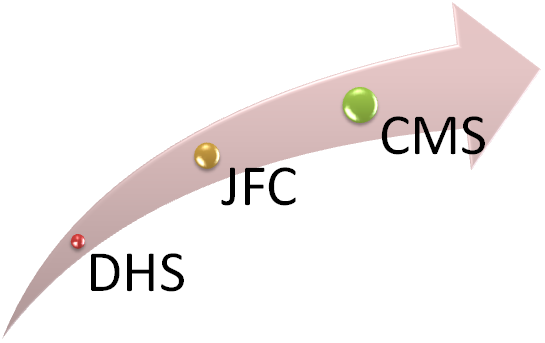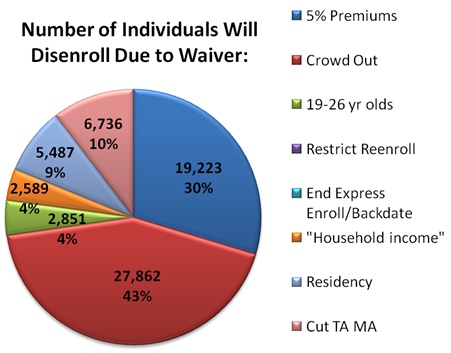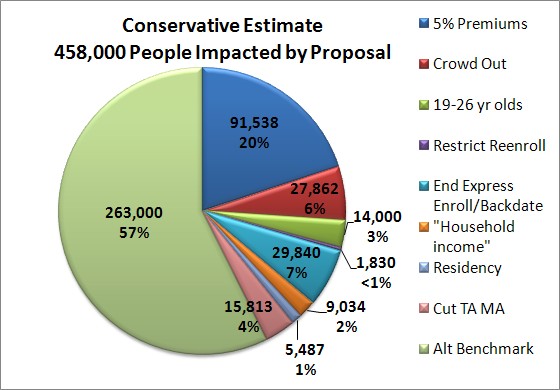.

.
Where the Rubber Stamp Hits the Paper
.
The Joint Finance Committee Passive Review
.
On Thursday, November 10, the Joint Finance Committee met to discuss and vote on the Wisconsin Department of Health Services proposal to drastically restructure and reduce enrollment in BadgerCare and Medicaid. On this day, 11 Republicans and 4 Democrats (Sen. Luther Olsen was absent) comprised the Joint Finance Committee. DHS Secretary Dennis Smith presented his proposal to the Committee. Recall that the Committee’s approval is all that is required to set the waiver request in motion to the federal government (CMS) for review. Act 32, the Wisconsin State Budget, delegated authority to Department of Health Services Secretary Smith to create changes in BadgerCare and Medicaid laws, needing only a "passive review" of the Joint Finance Committee, not a review by the full legislature. Therefore DHS will forward aspects of the plan that require federal approval to CMS. Calling a vote, the proposal of the Department of Health Services to approve all items included in the Maintenance of Effort waiver request, and all items related to Benchmark Plans was approved along party lines, 11-4. That same day, November 10, the waiver request was submitted to the Centers for Medicare and Medicaid Services (CMS).
.
Federal Approval or Termination of Adults
.
CMS typically has 90 days to review a waiver request, unless more information is needed from the state making the request. In this instance, however, the State has left CMS with fewer than 60 days to review the waiver request. Unfortunately over 53,000 childless adults in Wisconsin are, as Joint Finan ce Committee member Sen. Robert Jauch called them, "innocent hostages" caught in the middle of this DHS request and CMS review process and face BadgerCare program terminations if an approved waiver is not in place by Dec. 31, 2011. The state budget says that if the waiver isn’t approved by Dec. 31, 2011, those parents on BadgerCare Plus and adults on the Core Plan above 133% FPL will be dropped. Wisconsin Democratic legislators have asked Secretary Sebelius to help protect the 53,000 parents and adults on BadgerCare.
ce Committee member Sen. Robert Jauch called them, "innocent hostages" caught in the middle of this DHS request and CMS review process and face BadgerCare program terminations if an approved waiver is not in place by Dec. 31, 2011. The state budget says that if the waiver isn’t approved by Dec. 31, 2011, those parents on BadgerCare Plus and adults on the Core Plan above 133% FPL will be dropped. Wisconsin Democratic legislators have asked Secretary Sebelius to help protect the 53,000 parents and adults on BadgerCare.
 ce Committee member Sen. Robert Jauch called them, "innocent hostages" caught in the middle of this DHS request and CMS review process and face BadgerCare program terminations if an approved waiver is not in place by Dec. 31, 2011. The state budget says that if the waiver isn’t approved by Dec. 31, 2011, those parents on BadgerCare Plus and adults on the Core Plan above 133% FPL will be dropped. Wisconsin Democratic legislators have asked Secretary Sebelius to help protect the 53,000 parents and adults on BadgerCare.
ce Committee member Sen. Robert Jauch called them, "innocent hostages" caught in the middle of this DHS request and CMS review process and face BadgerCare program terminations if an approved waiver is not in place by Dec. 31, 2011. The state budget says that if the waiver isn’t approved by Dec. 31, 2011, those parents on BadgerCare Plus and adults on the Core Plan above 133% FPL will be dropped. Wisconsin Democratic legislators have asked Secretary Sebelius to help protect the 53,000 parents and adults on BadgerCare. .
How YOU Can Contact HHS to Comment on the Waiver
.
Let Your Voice Be Heard!
.
CMS does not have an "official" public comment process for the Wisconsin waiver request. Instead, you can contact the US Department of Health and Human Services (HHS) directly to comment on the Wisconsin DHS Waiver Request. Please send an email or call the Regional Director for our area, Kenneth Munson:
.
Kenneth Munson
Regional Director
Region V of the Department of Health and Human Service
Call: 312-353-5160
Email: Kenneth.Munson@hhs.gov
.
Mr. Munson will see that ALL comments on the waiver request (pro and con) are directed to appropriate CMS officials.
.
Joint Finance Topics for Discussion
.

HealthWatch Wisconsin observed the Joint Finance Committee debate and herein reports its observations, opinions and insight into the future of BadgerCare and Medicaid in Wisconsin.
.
Joint Finance Hears Waiver Request
.
In front of the Committee were elements of the Department of Health Services proposal that either change state law or are included in the “maintenance of effort waiver request.” This includes the "Alternative Benchmark Plan," where DHS is asking families above 100% FPL (equivalent to a family of 4 making approximately $22,000 a year) to participate in increased cost sharing with a reduced benefits package.
.
Maintenance of Effort waiver elements include:
- Restricting BadgerCare Plus from anyone who has access to private insurance
- Re-calculating family incomes
- Eliminating express enrollment and backdating on applications
- Increasing premiums
- Cutting Transitional Medicaid
- Restricting 19-26 year olds from BadgerCare Plus
- Requiring Proof of Residency
- Instantly denying BadgerCare Plus if verifications are late
- and more
All other elements of the proposal were not in front of the Committee and will not go to the Legislature. The authority delegated to Secretary Smith allows him to make the other changes without any review. Recall, the state budget permits Secretary Smith to terminate BadgerCare eligible adults above 133% FPL if the waiver isn’t approved by federal authorities by Dec. 31, 2011.
.
Joint Finance Convenes, Rep. Vos Makes Rules
.
Rep. Robin Vos (Co-Chair of the Joint Finance Committee) instituted a “two question” rule to limit discussion. Rep. Grigsby and Sen. Taylor expressed concern as to the fairness of the rule given the complexity and enormity of the proposal in front of them, taking into account that the full legislature did not get an opportunity to weigh in on the matter. Rep. Vos replied, “I am the chair and I decide the rules...The nice part is that we get to have a hearing today.” Of course, Vos didn't mean a "public hearing." There was no chance for public comment in front of the legislature on this proposal, again, thanks to Act 32.
.
Smith Summarizes the Cuts
.
Department of Health Services Secretary Smith began his comments by saying that he had been across the state listening to the people of Wisconsin. He believed his proposal protected seniors and the disabled, and those below 100% FPL. He stated that people above 150% FPL were only on BadgerCare in the first place because it was the option of the state. Under his waiver, the only individuals who would lose coverage will be those who "make the choice not to pay their fair share."
.
Smith said to give his proposal context he wanted to remind everyone that the last administration auto-enrolled people in the Core Plan in 2009, and the state was exceeding its funds. Wisconsin then chose to cap Core Plan enrollment. “The state could have chosen to enroll individuals but chose not to.” “That decision to cap the plan impacted more individuals than any part of the waiver.” Smith described the waiver as representing “a modest savings of 2% of state investment in the program.”
.
To finish his remarks, Smith very briefly addressed the Alternative Benchmark Plan. Smith identified Benchmark Plan benefits as being “comprehensive benefits.” He quickly added that “children will continue to have benefits through the EPSDT program.”
.
Smith, throughout the meeting, continually referenced the Core Plan enrollment "cap" and compared Wisconsin to other states. He said Wisconsin was struggling with ways to contain the cost of the growth of Medicaid, saying, “the overall cost of Medicaid will continue to grow.” He said it was his purpose to slow the rate of growth that looks “more in line with the economy.” Other states change co-pays, eliminate benefits across the board. Smith repeated that he wants to protect the rights of the disabled and seniors, and will therefore charge co-pays and eliminate benefits for other populations. Smith’s comments were short, summary statements, shy on detail or explanation. He opened the floor for questions.
.
Questions and comments are summarized below. Fast-forward to the final minutes before the Committee voted. Sen. Jauch closed with a quote from Hubert Humphrey, “The moral test of government is how that government treats those who are in the dawn of life, the children; those who are in the twilight of life, the elderly; and those who are in shadows of life, the sick, the needy, and the handicapped.” He repeated, “History will record Republican behavior on this issue. It is callous.” Rep. Corey Mason, Rep. Tamara Grigsby, and Sen. Lena Taylor gave just as moving comments. .
HealthWatch Initial Analysis & Comment
.
1. Not an Appropriate Waiver Request
.
Above all else, Section 1115 of the Social Security Act gives the Secretary of Health and Human Services authority to waive provisions of major health and welfare programs, including certain Medicaid requirements, and to allow a state to use federal Medicaid funds in ways that are not otherwise allowed under federal rules. The authority is provided at the Secretary’s discretion for demonstration projects that the Secretary determines promote Medicaid program objectives. What Secretary Dennis Smith put in front of the Joint Finance Committee was neither a demonstration project nor a plan to promote Medicaid program objectives. It wasn't even a test of the Affordable Care Act, another attempt by Secretary Smith to stretch the intent of the waiver. The Legislative Fiscal Bureau called attention to this fact in many instances throughout its review of the proposal. When evaluating the crowd-out provision (page 14), dependent coverage (page 16), or counting "household income" (page 21), the Fiscal Bureau identified Smith's proposal as "not an accurate test of the Affordable Care Act" for failure to implement similar provisions as the Act. Rep. Grigsby called what Smith proposed "a grand experiment...playing with people's lives," not a demonstration or test that promotes the objectives of Medicaid. Sen. Jauch suggested that we didn't even get to the threshold of what was appropriate for the federal government to evaluate; Smith wasn't even withholding the mission of the Department of Health Services: to protect and promote the health and safety of the people of Wisconsin.
.
2. Using EPSDT (Early Periodic Screening Diagnosis and Treatment) as a Cover
.
Smith presented the Alternative Benchmark Plan as not representing any benefits changes for children, since EPSDT would still be available. Smith said that the changes under Alternative Benchmark were not on the benefits side, but instead were on the cost sharing side. He said that was more comparable to private insurance.
.
We cannot agree with the premise of Smith's argument. Even though both Secretary Smith and Deputy Secretary Kitty Rhoades sang the praises of the Benchmark Plan as being "comprehensive coverage," it does in fact represent fewer benefits for increased cost to the families forced off the Standard Plan. While early periodic screening diagnosis and treatment (EPSDT, called "HealthCheck" in Wisconsin) provides for services and benefits, even those not included in the state plan, a family has to jump through hoops and hurdles to get to these benefits. Using HealthCheck means that many of the services children got on the Standard Plan will now have access restricted, with hurdles such as verifications, Prior Authorizations and clinical information. The Department, even under EPSDT retains discretion to approve referrals. But since the Walker administration has eliminated Consumer Assistance Grants and Civil Legal Services funding for low-income families, there are very limited opportunities to challenge these decisions.
.
Smith never identified a process for DHS to evaluate requests, such as reviewing medical necessity, establishing criteria for provision of services, and determining the amount, duration and scope of services. Nor did Smith identify how the Department would assist families seeking services through EPSDT, the outreach and education that would be needed to facilitate the requests, and the relationship with the HMOs charged to provide these "other services."
.
3. Choice is Not Part of the Equation
.
Secretary Smith noted that his proposed cuts were "not as bad" as the Core Plan cap. Smith reached this conclusion by first misrepresenting how the Core Plan was established and funded. His repeatedly characterized Core enrollees as having no choice--being auto-enrolled (which was only the method of enrollment for GAMP members when that Milwaukee program ended), while others were capped without choice of staying in the program by paying more.
.
.
Pick Your Poison:
.
How the Proposed Cuts Leave 64,748 Uninsured and an Unfulfilled Waiver Request Terminates 53,000 Adults
.
Not a Matter of Semantics
.
When Rep. Corey Mason was allowed to ask one of his two questions at the Thursday Joint Finance Committee meeting, he zeroed in on the people who would be cut from BadgerCare Plus because of the proposal Secretary Dennis Smith was offering. Mason called attention to the Legislative Fiscal Bureau Memo that identified almost 65,000 people who would not be eligible for BadgerCare Plus under the new proposal. Secretary Smith quibbled with the question. He said no one would be disenrolled. He said people would instead be impacted. I guess he could have called it "collateral damage." Smith then relied on his earlier introductory remarks, and repeated that the impact on people of his proposal was not as bad as the impact the previous administration made on people when they capped enrollment in the Core Plan. He said that at least under his plan people will have a choice. They can choose to leave BadgerCare if they choose not to pay the premiums.
.
The Legislative Fiscal Bureau staff explained that the enrollment impact could be described as “people who are technically eligible but will drop in response to the premium increase.”  The Bureau representative continued, saying that premiums were different than residency requirement, where the table shows that there will be disenrollment for those that aren’t technically eligible. After this clarification, Smith said “we’re just simply carrying over federal policy.” Rep. Mason was not willing to let the point of his question go. He stated, “At the end of the day, 65,000 people won’t be in BadgerCare.” Smith quickly replied, “Some will have insurance.” Yes, and some will have a source of care, too...the emergency room.
The Bureau representative continued, saying that premiums were different than residency requirement, where the table shows that there will be disenrollment for those that aren’t technically eligible. After this clarification, Smith said “we’re just simply carrying over federal policy.” Rep. Mason was not willing to let the point of his question go. He stated, “At the end of the day, 65,000 people won’t be in BadgerCare.” Smith quickly replied, “Some will have insurance.” Yes, and some will have a source of care, too...the emergency room.
 The Bureau representative continued, saying that premiums were different than residency requirement, where the table shows that there will be disenrollment for those that aren’t technically eligible. After this clarification, Smith said “we’re just simply carrying over federal policy.” Rep. Mason was not willing to let the point of his question go. He stated, “At the end of the day, 65,000 people won’t be in BadgerCare.” Smith quickly replied, “Some will have insurance.” Yes, and some will have a source of care, too...the emergency room.
The Bureau representative continued, saying that premiums were different than residency requirement, where the table shows that there will be disenrollment for those that aren’t technically eligible. After this clarification, Smith said “we’re just simply carrying over federal policy.” Rep. Mason was not willing to let the point of his question go. He stated, “At the end of the day, 65,000 people won’t be in BadgerCare.” Smith quickly replied, “Some will have insurance.” Yes, and some will have a source of care, too...the emergency room..
Rep. Tamara Grigsby said, “This doesn’t sound like a choice to me. We are leaving people without choices!” Grigsby continued, “This to me seems pretty harsh. A blatant and cold attempt to gut part of a well established safety net for our most vulnerable in Wisconsin, especially children. We are giving them a heck of a Christmas gift; a holiday surprise, taking away something as basic as health care. We used to be able to brag that we cover more people. Now, it’s embarrassing, the choices we have made. I’m embarrassed to be here with tit for tat...but it’s shameful to cut 65,000 people…but offer $2.3 billion in tax breaks is ok.” Turning her comment to Secretary Smith, Grigsby asked, “What is your answer for when these 65,000 actually become disenrolled, when they show up at the emergency room. What are people to do when they don’t have jobs, income or social support? And we’ve made it our business to rip away the safety net that is left. Will hospitals eat that cost? We know it will be the taxpayers and those paying…paying for worse life outcomes as we become the Mississippi of the north. Help me understand what happens when we send them the notice.”
.

Smith replied, “We should note…this is why a demonstration is being submitted in the first place.” Smith repeated, “We are more fair and equitable because we give people a choice.”
.
Sen. Lena Taylor asked Secretary Smith to be transparent, since he kept comparing the new proposal to the health reform law. Taylor insisted the Affordable Care Act calculates family income and dates of application differently than the new proposal. If Smith wanted a fair comparison, he’d compare apples to apples, not try to insist that his proposal is just a demonstration of what is to come under health reform. Smith’s response was to repeat, “We are protecting people with disabilities and the elderly.”
.
People, Not Widgets
.
Sen. Robert Jauch was more than disgusted with the proposal presented by Secretary Smith. In fact, he was disgusted with the presentation of the proposal. “It’s troubling for me to listen to the casual way you’re making a presentation that decreases health care for working families and unsuspecting children. It’s as if you’re talking about widgets instead of people. You use words like ‘fair,’ ‘equitable’ and ‘generous.’ I believe it to be inhumane and unjust. I am proud Wisconsin has the second lowest uninsurance rate, meaning healthier families and less uncompensated care in Wisconsin, where you’ve been a resident since January. Wisconsin has a Judeo-Christian tradition of taking care of thy neighbor. This cowardly legislature gave you [Smith] the authority to cut spending that impacts people’s lives. There have been cherished moments in Wisconsin history, when Thompson was governor and made a commitment to be a brother’s keeper….Now, there is a callous disregard and now we’re a brother’s keeper—unless you’re on BadgerCare.”
There have been cherished moments in Wisconsin history, when Thompson was governor and made a commitment to be a brother’s keeper….Now, there is a callous disregard and now we’re a brother’s keeper—unless you’re on BadgerCare.”
 There have been cherished moments in Wisconsin history, when Thompson was governor and made a commitment to be a brother’s keeper….Now, there is a callous disregard and now we’re a brother’s keeper—unless you’re on BadgerCare.”
There have been cherished moments in Wisconsin history, when Thompson was governor and made a commitment to be a brother’s keeper….Now, there is a callous disregard and now we’re a brother’s keeper—unless you’re on BadgerCare.”.
.
Conclusion
. 

The Joint Finance Committee rubber stamped a dangerous and foolish DHS proposal and failed in an essential responsibility to the people of Wisconsin. They failed to consider the greater good and the long term financial interests of the state. The Republican majority proved to be tone deaf to the concerns of families, children, and communities across the state served by the BadgerCare program. Sadly, the only groups that have the Republican majority's ear are a small band of ultra conservative insurance and other industry representative that put profit before human needs. They only think of "me" instead of "we." The actions of the committee will subject our economy to long term harm as we have fewer federal resources to cover medical care and larger uncompensated care costs (like certain emergency room services) that will drive up health care costs for everyone. But remember, damaging a program that affects 1.2 million people and many more family members and friends across Wisconsin is playing with fire. Before too long the smoldering will become a flame that could singe the short-sighted Republican majority.
We will certainly keep watch!
In This Issue
.
___________________
ABC for Health, in partnership with HealthWatch Wisconsin, a membership organization that focuses work on maximizing access to care and coverage for the people of Wisconsin, has developed “The HealthWatch Wisconsin Reporter.”
This special edition newsletter tackles the big issues, providing in-depth analysis and insight into complex public health and health coverage questions.
.
How the Medicaid Cuts Got to Committee
.
In the late afternoon hours of Halloween, Wisconsin's Department of Health Services Secretary Dennis Smith delivered his compiled list of proposed cuts (part 2 and part 3) of Wisconsin's Medicaid and BadgerCare Programs to Wisconsin's Joint Finance Committee. Formally called a "passive review request," Joint Finance Committee members had 14 days to review the materials and inform Joint Finance Co-chairs Sen. Darling or Rep. Vos by November 17 if they had any "concerns" about the request, and if they thought a meeting might be necessary. By Tuesday morning, November 1, an objection to the proposal was raised, and thus a meeting of the Committee will need to convene. Read the objection letter here.
.
.
DHS Complains about Health Reform in Letters to Sebelius, Touts Wisconsin's "Innovation" Over the Last Two Decades
.
State officials jumped on an opportunity to comment on proposed rules on topics of health reform law implementation when issued by the US Department of Health and Human Services (HHS). In four separate letters, the "Office of Free Market Health Care" spoke of the "inequities and confusion" health reform would create. Smith touted Wisconsin's history of being at the "forefront" of health coverage and creative programs and expressed concern that health reform would cause Wisconsin's time tested programs to suffer.
.
HealthWatch Wisconsin was struck by the irony of Smith's comments, submitted to HHS as he prepared for his testimony in front of the Joint Finance Committee, where his law-making and cuts to Wisconsin's nationally recognized BadgerCare Plus and Medicaid programs were set for passive review.
Read the Office of Free Market Health Care Comments on proposed Affordable Care Act Proposed Rules at the following links:
.
Reactions to the Joint Finance Committee decision:
- JFC passes Medicaid savings plans
- Save BadgerCare Coalition
- Wisconsin Alliance for Women's Health
- Wisconsin Council on Children & Families
- Citizen Action of Wisconsin
- One Wisconsin Now
- Rep. Mason
- Sen. Shilling
- Rep. Grigsby
- Planned Parenthood Advocates of Wisconsin
- AARP
- Joint Finance Committee
- Wisconsin State Journal
- Milwaukee Journal Sentinel
- Janesville Gazette
- Click Here to read a Press Release “Joint Finance Must Reject ‘BadgerCare Minus’ Proposal”
- Click Here to read a Press Release “DHS Medicaid Plans Panned as Redistribution of Medical Debt”
.
JOIN US...
.
...in uniting the Public Health Workforce through comprehensive education and advocacy
.
Become a member or subscriber of HealthWatch Wisconsin! Team up with an impressive effort in Wisconsin that champions education and the accurate dissemination of health coverage information and the accessibility of health coverage for all people in Wisconsin. Let HealthWatch help you amplify your voice! The membership and subscription year begins July 1 of each year, but individuals or organizations may join at any time! Click here to complete an application. Thank you!
.
.
Save the Date! HealthWatch 5th Annual Conference
.
February 27 & 28, 2012!
.
Madison will be the place to be this spring! As a Presidential primary approaches and "recall fever" is in the air, we'll gather elected officials, candidates, experts and more to discuss our featured topic "Waive Goodbye to Medicaid?" and get perspectives on the future of health coverage in Wisconsin! Mark your calendar for Monday and Tuesday, February 27 & 28 for the 5th Annual HealthWatch Wisconsin Conference! Watch your inbox in the coming weeks as registration for the great event will open December 1st.
.
Normal
0
false
false
false
EN-US
X-NONE
X-NONE
MicrosoftInternetExplorer4
.
.
.
Share your BadgerCare and
Medicaid Story:
.
In Wisconsin, about 1.2 million people rely on
BadgerCare and Medicaid programs to provide essential, affordable, and
effective health care services. And the impact of these programs
reaches thousands more--our friends, neighbors,
grandparents, colleagues, and health care providers large and
small in every county of Wisconsin. Tell your BadgerCare or Medicaid
Story! Why is BadgerCare or Medicaid important to you and your family?
What would happen if BadgerCare or Medicaid ended? CLICK HERE to
complete a story form!
.
.
HealthWatch Public Hearings:
The Human Impact of Medicaid/ BadgerCare Cuts in Wisconsin
.
HealthWatch Wisconsin has posted the complete video
footage of public testimony on the impact of proposed BadgerCare+ and
Medicaid cuts that will affect 1.2 million Wisconsinites covered by
these programs. Please CLICK HERE to
view these HealthWatch Wisconsin public hearings.
.
.
Do You Know the Advocate of the Year??
Help with the HealthWatch Annual Awards!
HealthWatch Wisconsin is currently accepting
nominations for the Third Annual HealthWatch Awards
to be presented at the HealthWatch Wisconsin annual conference. The
Health Watch Wisconsin council seeks to recognize outstanding work in
healthcare advocacy and service in four categories. Click on the
category you wish to nominate someone for to download a nomination form!
- Advocate of the Year
- Elected Official of the Year
- Outstanding Outreach Effort Award
- Outstanding Media Coverage Award
Return your form to HealthWatch Wisconsin by email,
FAX: 608-261-6938 or US Mail: 32 N. Bassett St., Madison, WI 53703. To
view last year’s winners, Click Here.
.
HealthWatch Wisconsin Update Staff
.
ABC
for Health, Inc.
is a Wisconsin-based, nonprofit public interest law firm dedicated to
linking children and families, particularly those with special health
care needs, to health care benefits and services. ABC for Health’s
mission is to provide information, advocacy tools, legal services, and
expert support needed to obtain, maintain, and finance health care
coverage and services.
(608)261-6939
.
If you know someone who might be interested, please Forward this Newsletter >>
No comments:
Post a Comment